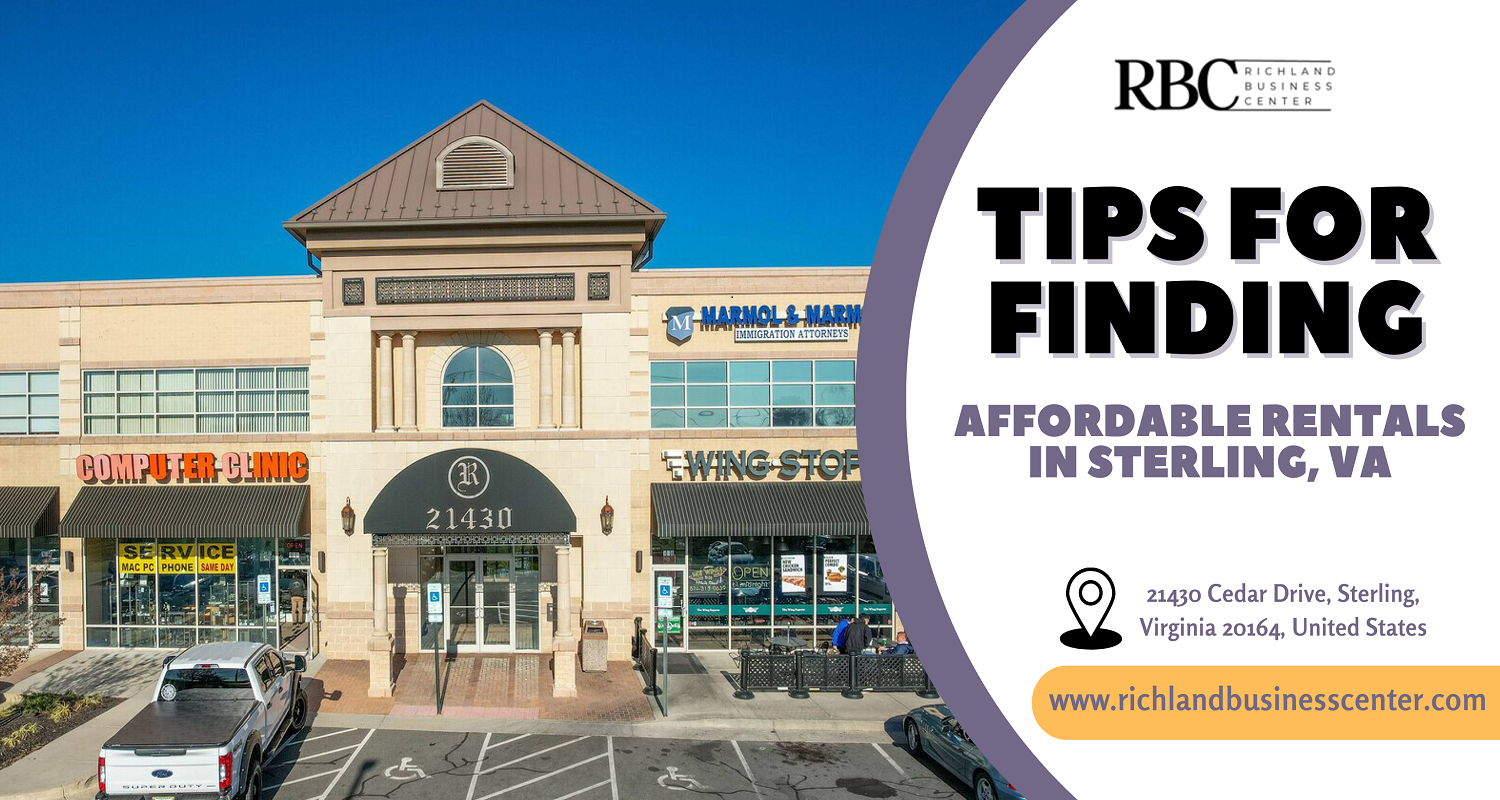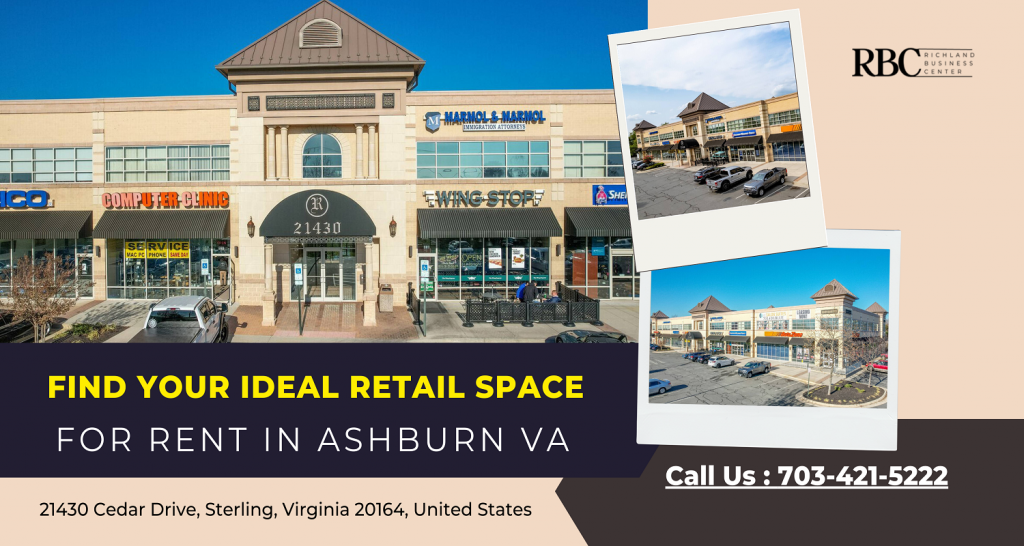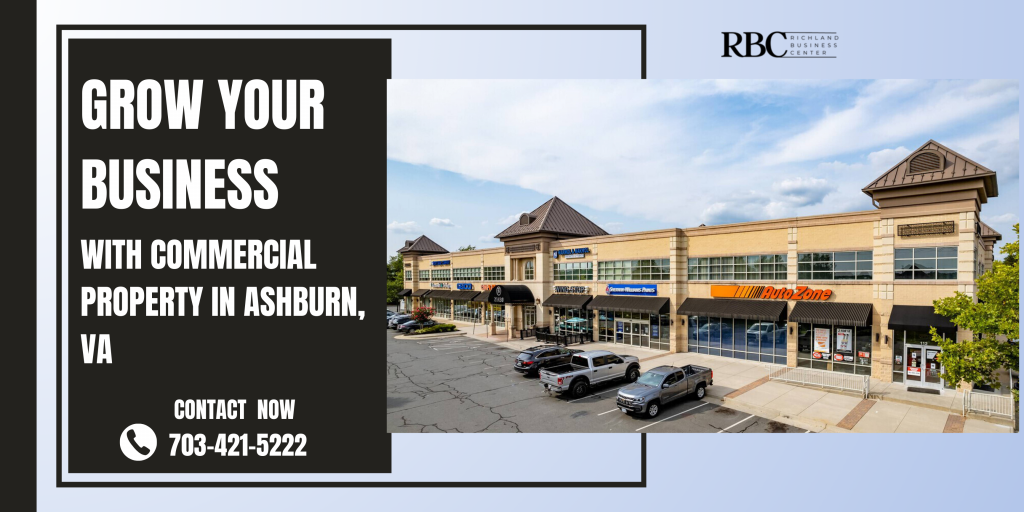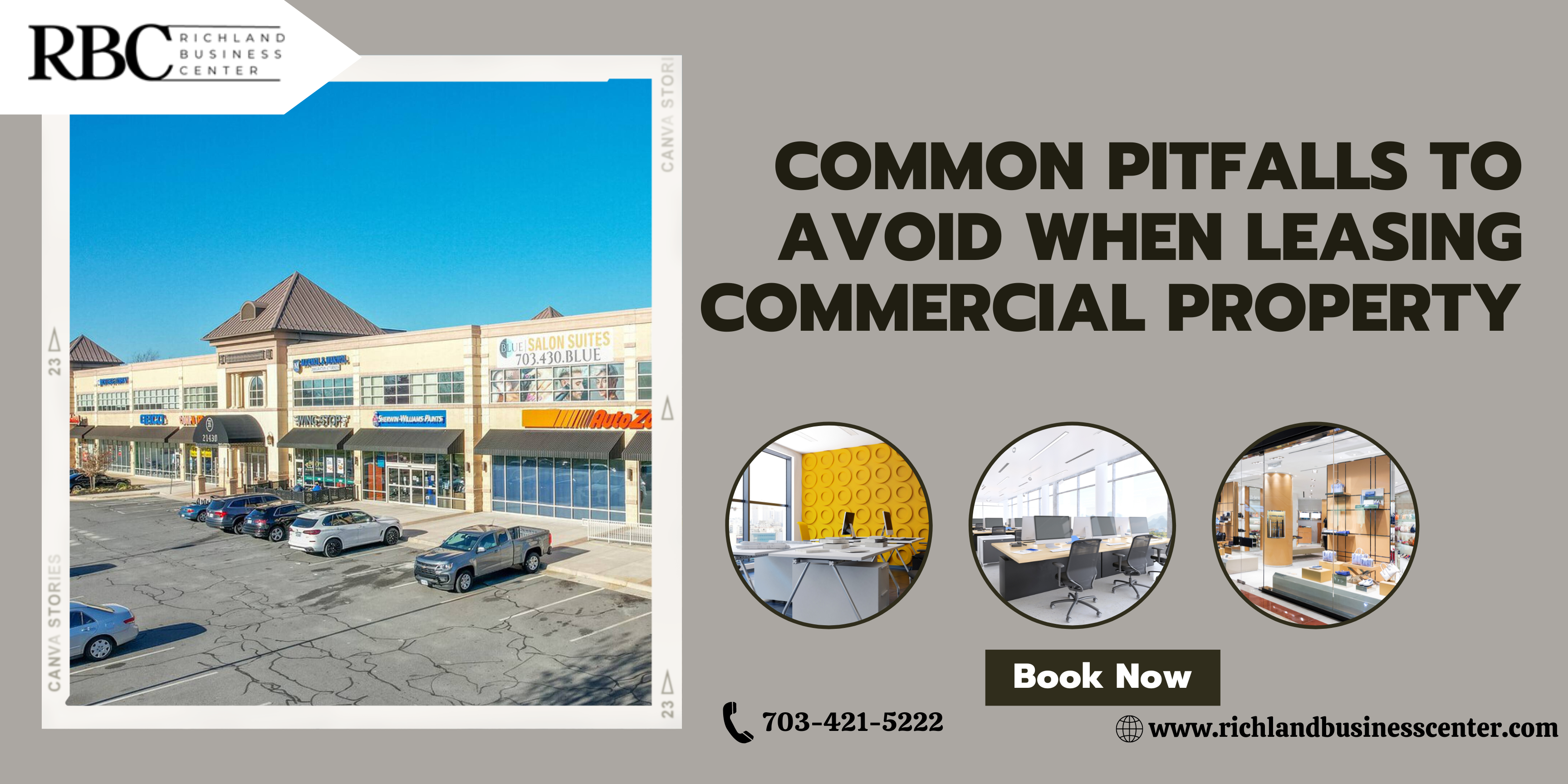Tips for Finding Affordable office Rentals in Sterling, VA
 Welcome to our comprehensive guide to finding affordable rentals in Sterling, VA! Whether you’re in search of the perfect apartment, house, or office space for rent in Sterling, VA, navigating the rental market can be a daunting task. With housing costs on the rise, it’s more important than ever to arm yourself with the knowledge and resources needed to secure a rental that fits your budget and lifestyle. In this guide, we’ll take you step-by-step through the process of finding the ideal rental property in Sterling, from setting your budget and researching the area to negotiating rental terms and handling setbacks along the way. Whether you’re a newcomer to the area or a longtime resident looking for a change, our goal is to empower you with the tools and insights necessary to unlock the secrets of the Sterling rental market and find the perfect place to call home or set up your business.
Welcome to our comprehensive guide to finding affordable rentals in Sterling, VA! Whether you’re in search of the perfect apartment, house, or office space for rent in Sterling, VA, navigating the rental market can be a daunting task. With housing costs on the rise, it’s more important than ever to arm yourself with the knowledge and resources needed to secure a rental that fits your budget and lifestyle. In this guide, we’ll take you step-by-step through the process of finding the ideal rental property in Sterling, from setting your budget and researching the area to negotiating rental terms and handling setbacks along the way. Whether you’re a newcomer to the area or a longtime resident looking for a change, our goal is to empower you with the tools and insights necessary to unlock the secrets of the Sterling rental market and find the perfect place to call home or set up your business.
Researching the Sterling, VA Area
Researching the Sterling, VA area is a crucial step in finding affordable rentals that align with your lifestyle and preferences. Here’s a deeper dive into this important aspect of your rental journey:
Exploring Neighborhoods
Sterling is home to a diverse range of neighborhoods, each with its unique character and amenities. Take the time to explore different areas of Sterling to get a feel for the community vibe and atmosphere. Consider factors such as proximity to schools, parks, shopping centers, and public transportation hubs. Think about what matters most to you in a neighborhood – whether it’s walkability, access to outdoor recreational activities, or a vibrant dining scene – and prioritize accordingly.
Assessing Amenities and Transportation
When researching the Sterling area, pay close attention to the amenities and transportation options available in each neighborhood. Look for convenient access to grocery stores, restaurants, healthcare facilities, and other essential services. Evaluate the quality of local schools if you have children or are planning to start a family. Additionally, consider transportation options such as bus routes, metro stations, and major highways for easy commuting to work or other destinations.
Gathering Insights from Local Residents
One of the best ways to get a feel for a neighborhood is to hear from the people who live there. Reach out to residents through community forums, social media groups, or neighborhood associations to gather insights and firsthand experiences. Ask about safety, community events, schools, and any other topics that are important to you. By tapping into the knowledge of locals, you’ll gain valuable insights that can inform your decision-making process.
Exploring Crime and Safety Data
Safety is a top priority when choosing a neighborhood to call home. Take the time to research crime rates and safety statistics for different areas of Sterling. You can find this information through local police department websites, crime mapping tools, or community safety reports. Pay attention to factors such as violent crime, property crime, and overall neighborhood safety ratings to ensure that you feel comfortable and secure in your new rental neighborhood.
Considering Future Development Plans
Lastly, consider any future development plans or infrastructure projects that may impact the Sterling area. Look for information on upcoming construction projects, zoning changes, or urban development initiatives that could affect property values or neighborhood dynamics. Understanding the long-term vision for the area can help you make informed decisions about where to rent and invest in Sterling.
Setting Your Budget
Setting your budget is a critical step in the process of finding affordable rentals in Sterling, VA. This phase involves carefully assessing your financial situation to determine how much you can comfortably afford to allocate towards rent each month. Here’s a more detailed explanation:
1. Calculating Your Rental Budget
- Income Evaluation: Begin by calculating your total monthly income. This includes wages from employment, any additional sources of income, and any financial support you may receive.
- Expense Assessment: Next, evaluate your monthly expenses. Take into account essential expenses such as groceries, utilities, transportation, and healthcare, as well as discretionary spending on entertainment and leisure activities.
- Determining Affordability: Once you have a clear picture of your income and expenses, subtract your total expenses from your total income to determine your disposable income. From this amount, decide how much you’re willing to allocate towards rent each month. Experts generally recommend that rent should not exceed 30% of your gross monthly income to ensure financial stability.
2. Identifying Your Non-Negotiables
- Prioritize Needs vs. Wants: Consider what amenities and features are essential for your living situation versus those that are merely desirable. For example, proximity to work or school, access to public transportation, and safety may be non-negotiable factors for you.
- Setting Limits: Determine the maximum amount you’re willing to spend on rent based on your budget calculations. Be realistic about what you can afford while also considering your desired quality of life.
Why It’s Important:
Setting a realistic budget ensures that you’re able to comfortably afford your rental payments without sacrificing other financial obligations or lifestyle preferences. It helps you avoid the stress of living beyond your means and protects you from potential financial strain in the future. By establishing clear parameters upfront, you can focus your search on rentals that align with your financial goals and priorities, ultimately leading to a more successful and satisfying renting experience in Sterling, VA.
ReFind your ideal workspace today in Sterling, VA! Explore our office suites for rent now.
Engaging with Local Real Estate Agents
Engaging with local real estate agents is a crucial step in your quest to find affordable rentals in Sterling, VA. These professionals are well-versed in the local rental market and can provide valuable insights and guidance to help you navigate the process effectively. Here’s a deeper dive into why and how to engage with real estate agents:
Benefits of Working with Agents
- Market Knowledge: Local real estate agents have intimate knowledge of the Sterling rental market, including current rental trends, pricing dynamics, and neighborhood preferences. Their expertise can help you identify hidden gems and avoid overpriced rentals.
- Access to Exclusive Listings: Many landlords choose to work exclusively with real estate agents to market their rental properties. By partnering with an agent, you gain access to a wider range of listings that may not be publicly available, giving you a competitive edge in your search.
- Negotiation Skills: Real estate agents are skilled negotiators who can advocate on your behalf to secure favorable rental terms. Whether it’s negotiating lower rent, requesting lease concessions, or resolving disputes with landlords, having an agent in your corner can help you achieve your desired outcomes.
How to Engage with Agents
- Research: Start by researching local real estate agencies and agents who specialize in rental properties in Sterling. Look for agents with a proven track record of success and positive client reviews.
- Consultation: Schedule a consultation with prospective agents to discuss your rental needs, budget, and preferences. Use this opportunity to assess their knowledge of the local market and their willingness to assist you in your search.
- Ask Questions: During your consultation, don’t hesitate to ask questions about the agent’s experience, familiarity with Sterling neighborhoods, and their approach to helping clients find rentals. Be sure to inquire about any special deals or incentives they can offer to make your rental search more cost-effective.
- Establish Clear Communication: Once you’ve chosen an agent to work with, establish clear lines of communication and provide them with detailed information about your rental criteria. Be proactive about communicating your preferences and any changes in your search criteria to ensure that they can tailor their recommendations accordingly.
- Follow Through: Stay engaged throughout the rental process and follow through on any recommendations or leads provided by your agent. Keep an open mind and be receptive to their guidance and advice, as they have your best interests at heart.
By engaging with local real estate agents, you can leverage their expertise and resources to streamline your rental search and increase your chances of finding an affordable rental that meets your needs and preferences in Sterling, VA.
Exploring Alternative Housing Options
A. Considering Roommate Scenarios
Living with roommates can significantly reduce your monthly housing expenses by splitting rent and utilities among multiple people. This option is particularly popular among young professionals, students, and individuals looking to save money on housing costs. When considering a roommate scenario, it’s essential to:
- Set Clear Expectations: Communicate openly with potential roommates about expectations regarding rent, utilities, chores, and personal boundaries.
- Screen Potential Roommates: Take the time to vet potential roommates to ensure compatibility in terms of lifestyle, habits, and financial responsibility.
- Draft a Roommate Agreement: Establish a written agreement outlining rent responsibilities, shared expenses, house rules, and conflict resolution procedures to avoid misunderstandings down the line.
B. Exploring Renting from Homeowners
Renting directly from homeowners can offer several advantages over traditional rental properties, including:
- Flexibility: Homeowners may be more open to negotiating lease terms, allowing for shorter or more flexible rental periods.
- Personalized Rental Arrangements: Homeowners may be willing to customize the rental agreement to accommodate specific needs or preferences, such as allowing pets or making minor modifications to the property.
- Lower Competition: Rental properties owned by individual homeowners may have less competition compared to large apartment complexes, increasing your chances of securing a desirable rental at an affordable price.
- Community Connection: Renting from a homeowner often provides a more personalized and community-oriented living experience, with the opportunity to build a rapport with the landlord and neighbors.
Exploring these alternative housing options can open up new possibilities for finding affordable rentals in Sterling, VA, while also providing unique living experiences and opportunities for savings. Whether you opt for a roommate scenario or choose to rent from a homeowner, be sure to carefully consider your priorities, preferences, and budgetary constraints to find the perfect housing solution for your needs.
Examining Rental Property Conditions
When examining rental property conditions, it’s essential to conduct a thorough inspection to ensure that the property is in good shape and meets your expectations before signing a lease agreement. Here’s a breakdown of what this process entails:
- Inspecting Interior Spaces: Begin by examining the interior spaces of the rental property, including bedrooms, living areas, kitchen, and bathrooms. Look for signs of damage such as cracked walls, water stains, or mold growth. Test light switches, faucets, and appliances to ensure they are in working order.
- Checking for Safety Hazards: Pay close attention to potential safety hazards such as exposed wiring, loose handrails, or faulty smoke detectors. Ensure that windows and doors are secure and that there are no tripping hazards such as loose floorboards or uneven surfaces.
- Assessing HVAC Systems: Test the heating, ventilation, and air conditioning (HVAC) systems to ensure they are functioning correctly. Listen for unusual noises or odors that may indicate a problem, and inquire about the last time the systems were serviced or inspected.
- Examining Plumbing and Water Fixtures: Check for leaks or water damage around sinks, toilets, and showers. Run faucets and flush toilets to test water pressure and drainage. Look for signs of rust or corrosion that may indicate plumbing issues.
- Inspecting Appliances and Fixtures: Take note of the condition of any appliances provided with the rental, such as refrigerators, stoves, and dishwashers. Ensure that they are in good working order and free of damage or defects. Test light fixtures and ceiling fans to ensure they are functional.
- Surveying Outdoor Areas: Don’t forget to inspect outdoor areas such as balconies, patios, and yards. Look for signs of pest infestations, overgrown vegetation, or damage to fencing or landscaping. Check for adequate lighting and security measures in place.
- Documenting Observations: As you conduct your inspection, take thorough notes and photographs to document any issues or concerns you encounter. This documentation will serve as evidence in case disputes arise with the landlord regarding the condition of the property.
- Communicating with the Landlord: After completing your inspection, discuss any findings with the landlord or property manager. Bring attention to any areas of concern and inquire about plans for addressing them before move-in. Be sure to obtain written documentation of any agreed-upon repairs or improvements.
By carefully examining rental property conditions before signing a lease, you can avoid potential headaches and ensure a smooth transition into your new home. Don’t hesitate to advocate for yourself and ask questions about any aspects of the property that are unclear or concerning. Your peace of mind is worth the extra effort!
ReFind your ideal workspace today in Sterling, VA! Explore our office suites for rent now.
Creating a Checklist for Property Visits
Creating a checklist for property visits is an essential step in the rental search process as it helps you stay organized and ensures that you thoroughly evaluate each potential rental property. Here’s a detailed explanation of how to create and utilize a property visit checklist:
- Compile Key Features: Start by compiling a list of key features and amenities that are important to you in a rental property. This could include factors such as the number of bedrooms and bathrooms, kitchen appliances, storage space, parking availability, laundry facilities, and pet policies.
- Prioritize Your Needs: Prioritize your checklist based on your needs and preferences. Identify which features are non-negotiables and which ones you’re willing to compromise on if necessary. This will help you focus your attention during property visits and make more informed decisions.
- Document Your Impressions: Create a section on your checklist to document your impressions of each property you visit. Take notes on the overall condition of the property, including any visible wear and tear, cleanliness, and maintenance issues. Pay attention to details such as the condition of the walls, floors, appliances, fixtures, and windows.
- Take Photos: Consider taking photos during your property visits to supplement your notes and provide visual documentation of each property’s features and condition. This can be especially helpful if you’re visiting multiple properties and need a way to compare them later on.
- Ask Questions: Leave space on your checklist to jot down any questions or concerns that arise during your property visits. Take the opportunity to ask the landlord or property manager about any uncertainties you have regarding the property, such as lease terms, utilities, maintenance responsibilities, and neighborhood amenities.
- Evaluate Surrounding Area: Don’t forget to evaluate the surrounding area during your property visits. Take note of factors such as noise levels, proximity to public transportation, schools, grocery stores, restaurants, parks, and other amenities that may impact your daily life.
- Review Your Checklist: After each property visit, take some time to review your checklist and reflect on your impressions. Consider how each property stacks up against your criteria and whether it meets your needs and expectations. Use your checklist as a reference point when comparing different properties and making your final decision.
By creating a checklist for property visits, you can streamline your rental search process, stay organized, and make more informed decisions about which rental property is the best fit for you. Remember to be thorough in your evaluations and trust your instincts when assessing each property’s suitability for your needs and lifestyle.
Conclusion
In conclusion, navigating the rental market in Sterling, VA can be a daunting task, but armed with the right knowledge and resources, finding affordable rentals is entirely achievable. By following the comprehensive guide outlined above, you can confidently embark on your rental search journey, equipped with the tools to identify the perfect place to call home. Remember to prioritize your needs, conduct thorough research, and leverage online resources and local expertise to maximize your options. Whether you’re seeking a cozy apartment, a spacious house, or even office space for rent in Sterling, VA, there’s a perfect rental property waiting for you. Stay persistent, stay proactive, and before you know it, you’ll be settling into your new home in the vibrant community of Sterling.
Frequently Asked Questions (FAQs)
Q1: How far in advance should I start looking for rentals?
Ans: It’s recommended to start your rental search at least 60-90 days before your desired move-in date. This allows ample time for research, property visits, and application processing, ensuring that you find the right rental property without feeling rushed.
Q2: How can I negotiate a lower rent with a landlord?
Ans: Negotiating lower rent with a landlord requires preparation and strategy. Consider offering to sign a longer lease term, prepaying rent upfront, or highlighting your strong rental history and references. It’s also helpful to research comparable rental properties in the area to support your negotiation efforts.
Q3: What are the typical lease terms in Sterling, VA?
Ans: Lease terms in Sterling commonly range from 6 to 12 months for residential rentals. However, some landlords may offer shorter or longer lease options depending on their preferences and the local rental market conditions. Be sure to review the lease agreement carefully and clarify any terms or conditions before signing.




